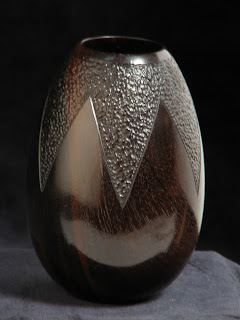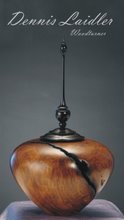
Izak is very much one of the founding fathers of artistic woodturning in South Africa. He lives in Cape Town and is an active member of Western Cape Woodturning Association. He is extremely talented and shares his knowledge very generously. He provides immense encouragement to the whole turning fraternity in South Africa
Izak is a wonderfully animated auctioneer and each year 'performs' the AWSA conference auction, wringing blood out of a stone, in the nicest possible way, to benefit the chosen charity

Beyers lives with his family in Graaf Reinet.
Beyers is also an immensly talented turner, definitely following in his father's footsteps. Beyers specializes in turning real 'character' pieces from indigenous hardwoods.
Unfortunately Beyers could only get me a single picture of his wonderful work - the third last picture in the series below
3/5/07 - I have just added a further picture of a piece by Beyers that he exhibited at the 2007 AWSA Conference
and two further pieces on 8/5/07.
AWSA Conference Auction, Johannesburg, 2005
Onthou Beyers! "Ek gaan nou duuuu...r betaal!"

Izak is also the driving force behind Waterfront Woodturners, an outlet at the Cape Town Waterfront shared by 8 local woodturners including of course Izak, Beyers and myself
This was a wonderful piece that Izak finished in April 2003.
We called it his 'pregnant lady' from the way that everyone who handled it fondled it's georgeous curvaceous form.
Carl I have uploaded more than one pic of each of Izak's recent pieces below so that you can choose which exposure you prefer to download and use.

IMG_6544.jpg
Cape Beech Dish – Rapanea melanophloeos – Slightly spalted
150mm (h) x 180mm (w)
The spalting must be controlled or else the wood deteriorates very quickly.
If the spalted wood is worked at the right time the figuring of the wood is still very pronounced as seen from the photo.

IMG_6546.jpg

IMG_6548.jpg
Stinkwood Platter – Ocotea bullata – with gold leaf
53mm (h) x 295mm (w)
Legend has it that when the tree grows near a steam of water it absorbs some alluvial gold. Hence, the belief that the yellow swirls in the wood of older trees shows the gold. This story inspired me to add the truth of the legend.

IMG_6550.jpg

IMG_6573.jpg

IMG_6575.jpg

IMG_6558.jpg
Stinkwood Vase – Ocotea bullata
120mm (h) x 120mm (w)
This wood was salvaged from a pile of off-cuts from a furniture manufacturer. It dates to circa1950 and lends itself to retain the signs of age in the partly natural edge

IMG_6561.jpg

IMG_6565.jpg
Red(Pink) Ivory Vase – Berchemia zeyheri – 170mm (h) x 140mm (w)
A gift from a friend who salvaged it from a pile of firewood
It is the first time I tried to turn red ivory, this size, end grain. Hard work but well worth it; the natural edge was lightly scorched and other natural blemishes were retained as much as possible

IMG_6566.jpg

IMG_6570.jpg
White Alder Platter - Platylophus trifoliatus
515mm (diam)
The wood is relatively soft and varies in colour from almost white to dark brown and has a pleasant sweet fragrance. This evergreen tree has a sprawling habit; massive old stumps produce a number of coppice shoots which grow into sizeable stems.
The centerpiece insert is Kamassi, Gonioma kamassi, a very valuable timber, similar to boxwood, used for precision instruments and now hardly ever harvested in the state controlled forests

IMG_6571.jpg

IMG_7087.jpg
Wild Olive vase - Olea europaea ssp. africana
xxxmm (h) x mm (w)

Beyers.jpg
Parasitic Growth – Mistletoe – Viscum rotundifolium
115mm (h) x 170mm (diam)
Yellow through orange to red sticky fruits adhere to the bills and feathers of birds and are deposited on their nesting trees, or rubbed off on trees when they clean their beaks. The mistletoe then germinates and grows on a branch taking its food from the host. The mistletoe can grow up to one meter (3 feet) in diameter. In the case of heavy infestation it can kill the host

HPIM2493.jpg
Here is a photograph of the blank for the piece above just after it was harvested
Here is what Beyers says about the interesting mistletoe turning above,
"The piece is from the growth caused by misltoe growing on a host plant in this case it is mesquite. My wife found the growth while riding her horse for endurance fitness training.
When you have a unique piece of wood you ask yourself what do you want to make. You play around with designs on your sketch pad and finally decide on a design.
For this piece of wood I wanted to turn a hollow form very close to a sphericl shape but the best laid plans of mice and men, and the wood decided that the design and what it wanted to be were two different things, therefor a natural edged bowl."

IMG_6834.jpg
Stinkwood - Ocotea bulata
105mm (h) x 65mm (diam)
This is a piece displayed by Beyers at the 2007 AWSA Conference

bakke07 03.jpg
Red Ivory Platter – Berchemia zeyheri
35mm (h) x 127mm (diam)

BC2_2_1.jpg
Stinkwood - Ocotea bulata
50mm (h) x 70mm (diam)


No comments:
Post a Comment